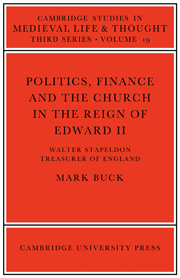Book contents
- Frontmatter
- Contents
- Dedication
- Acknowledgements
- Abbreviations
- 1 INTRODUCTION
- 2 FAMILY AND EARLY LIFE
- 3 THE BISHOPRIC OF EXETER
- 4 ROYAL FREE CHAPELS
- 5 THE FOUNDATION OF STAPELDON HALL
- 6 POLITICS AND DIPLOMACY 1309–13
- 7 THE CONSOLIDATION AND COLLAPSE OF ROYAL POWER 1320–1326
- 8 THE EXCHEQUER
- 9 THE CASE AGAINST STAPELDON
- 10 MURDER
- Appendix of documents
- Bibliography
- Index
- Frontmatter
- Contents
- Dedication
- Acknowledgements
- Abbreviations
- 1 INTRODUCTION
- 2 FAMILY AND EARLY LIFE
- 3 THE BISHOPRIC OF EXETER
- 4 ROYAL FREE CHAPELS
- 5 THE FOUNDATION OF STAPELDON HALL
- 6 POLITICS AND DIPLOMACY 1309–13
- 7 THE CONSOLIDATION AND COLLAPSE OF ROYAL POWER 1320–1326
- 8 THE EXCHEQUER
- 9 THE CASE AGAINST STAPELDON
- 10 MURDER
- Appendix of documents
- Bibliography
- Index
Summary
It is clear from the foregoing account of the 1320s that, apart from the period of Roger Beler's ascendency, Stapeldon was actively engaged in the formulation and administration of financial policy. We must now examine the nature of that policy and attempt to discover how novel it was and how much unpopularity it incurred. We must also consider to what extent Stapeldon can be held responsible for it and what part it played in his downfall.
The financial history of the early fourteenth century has been impaired by the theories of household government adumbrated by T. F. Tout and J. Conway Davies. Both these historians correctly discerned the growing concentration of patronage and power in the hands of the King and the consequent importance of the court and royal household in political management. But Tout in particular went further than this. He institutionalised political discord along administrative lines. For him the household departments, Chamber and Wardrobe, were the king's own, the tools with which he sought to establish autocratic control over his baronial opponents who ensconced themselves in the departments of state. These departments of state, Chancery and Exchequer, having gone out of court, were consequently susceptible to aristocratic and even parliamentary control. Tout's picture represents a reaction against Stubbs' exaltation of parliament under Edward I. Doubting that parliament was sufficiently mature to provide a firm base of opposition to the Crown, he substituted for it the permanent civil service.
- Type
- Chapter
- Information
- Politics, Finance and the Church in the Reign of Edward II , pp. 163 - 196Publisher: Cambridge University PressPrint publication year: 1983



